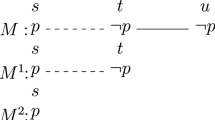Abstract
Since Fitch’s proof that not all propositions are knowable, philosophers have analysed the concept of knowability and sought a schema for the knowable propositions. A recent development in dynamic epistemic logic (DEL) has been to read ‘knowable’ as ‘known after an announcement’. Arbitrary Public Announcement Logic (APAL) and Sequential Public Announcement Logic (SPAL) are two DELs that have depicted this reading of knowability. We argue that neither APAL nor SPAL provide a satisfactory and principled schema of the knowable propositions. Instead, we claim that knowability is linked with settledness; stability of truth. We augment SPAL with a settled operator to create a new logic, Dual Sequential Public Announcement Logic (DSPAL). We prove in DSPAL a principled schema of knowability, that all settled propositions are knowable.
Similar content being viewed by others
Notes
These Moorean sentences also form the basis of Fitch’s paradox itself. The proof of the paradox works by assuming that not all facts are known, thus there exists a true Moorean sentence. It then shows that this Moorean sentence cannot be known - a contradiction with the claim that all truths are knowable (Brogaard and Salerno 2013).
van Ditmarsch et al. (2012) additionally proved that if a proposition is APAL learnable, then it is Wh-knowable.
In fact, recent work by van Ditmarsch et al. (2016) shows larger issues with the original APAL semantics, in particular with the arbitrary announcement operator.
Note that this is not to conflate concievability with possibility and it is open to whether or not the winner of the 2026 World Cup is already determined. It is merely an appeal to intuitions that certain physical facts may not have been decided.
Nomological instances are instances that relate to laws that lack logical necessity, e.g. laws of nature. We might think for example that there is a physical event occurring right now that determines whether we will see the sun rising tomorrow. These laws of nature may cause certain future events to be settled before they occur.
References
Balbiani, P., Baltag, A., Ditmarsch, H. V., Herzig, A., Hoshi, T., & De Lima, T. (2008). ’Knowable’ as ’Known after an announcement’. In Review of Symbolic Logic, volume 1 (pp. 305–334). Cambridge University Press.
Barnes, E., & Cameron, R. (2009). The open future: Bivalence, determinism and ontology. Philosophical Studies, 146(2), 291–309.
Broersen, J., Herzig, A., & Troquard, N. (2006). From Coalition Logic to STIT. Electronic notes in theoretical computer science, 157(4 SPEC. ISS.), 23–35.
Brogaard, B., & Salerno, J. (2013). Fitch’s Paradox of knowability. In E. N. Zalta (Ed.), The stanford encyclopedia of philosophy. Metaphysics Research Lab, Stanford University, winter 201 edition.
Fitch, F. B. (1963). A logical analysis of some value concepts. The Journal of Symbolic Logic, 28(2), 135–142.
Herzig, A., & Troquard, N. (2006). Knowing how to play: Uniform choices in logics of agency. In Proceedings of the international conference on autonomous agents, volume 2006 (pp. 209–216).
Holliday, W. H. (2018). Knowledge, time, and paradox: Introducing sequential epistemic logic. In Outstanding contributions to logic, volume 12 (pp. 363–394). Springer.
Horty, J. F., & Belnap, N. (1995). The deliberative stit: A study of action, omission, ability, and obligation. Journal of Philosophical Logic, 24(6), 583–644.
Kvanvig, J. L. (2006). The Knowability Paradox. Oxford: Oxford University Press.
Quine, W. V. O. (2019). Word and object. Cambirdge: The MIT Press.
van Benthem, J. (2004). What one may come to know. Analysis, 64(282), 95–105.
van Benthem, J., & Liu, F. (2007). Dynamic logic of preference upgrade. Journal of Applied Non-Classical Logics, 17(2), 157–182.
van Ditmarsch, H., van der Hoek, W., & Iliev, P. (2012). Everything is knowable: How to get to know whether a proposition is True. Theoria, 78(2), 93–114.
van Ditmarsch, H., van der Hoek, W., & Kuijer, L. B. (2016). Fully arbitrary public announcements. In Advances in modal logic, volume 11 (pp. 252–267). College Publications, New York.
Xu, M. (2015). Combinations of stit with ought and know. Journal of Philosophical Logic, 44(6), 851–877.
Acknowledgements
The content of this paper was originally written under the guidance of my supervisor, Dr Julien Dutant (King’s College London). His technical suggestions regarding the settled operator helped shaped this work and I am truly thankful for his knowledge and guidance.
Author information
Authors and Affiliations
Corresponding author
Additional information
Publisher's Note
Springer Nature remains neutral with regard to jurisdictional claims in published maps and institutional affiliations.
Rights and permissions
About this article
Cite this article
Xu, K. Everything is learnable, once it is settled. Synthese 199, 4795–4817 (2021). https://doi.org/10.1007/s11229-020-03003-5
Received:
Accepted:
Published:
Issue Date:
DOI: https://doi.org/10.1007/s11229-020-03003-5




